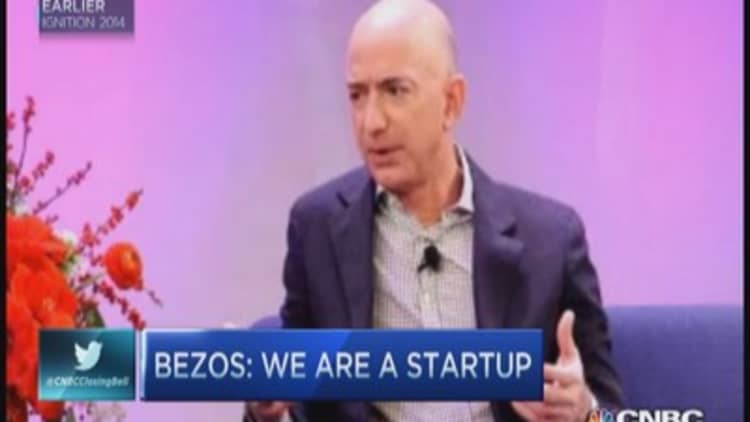Microsoft established dominance in the software market by selling its Windows suite to the world's biggest companies. Scott Guthrie's job is to reach some of the smallest.
Guthrie, who took over Microsoft's cloud business when Satya Nadella was elevated to chief executive officer in February, is spanning the globe, promoting the company's cloud tools to the rapidly evolving developer community.
In recent months, he's visited incubators in Singapore and China, and will be headed to Israel in early 2015, all in an effort to get a new generation of techies building on top of Microsoft. Next month he'll speak at Y Combinator, the prominent San Francisco start-up incubator, for the first time.
"It's a good sign that we've seen so much developer interest lately," said Guthrie, executive vice president of the Redmond, Washington-based company's cloud and enterprise group. "It's a good indication of how far the product has come."
It's vitally important, because in cloud services, Microsoft (as well as rival Google), have a ways to go to catch up with market leader Amazon.com and its Web Services (AWS) division.
From $3.6 billion last year, cloud infrastructure will expand 31 percent a year through 2018, according to IDC. Amazon currently controls 40 percent of the market—also according to IDC—but the numbers are fuzzy because companies don't break out infrastructure sales. Synergy Research Group says Amazon has 27 percent market share, followed by Microsoft at 10 percent, IBM at 7 percent and Google at 5 percent.
Read MoreHow Microsoft is ensuring cloud security
Microsoft's product Azure is the company's answer to Amazon, which has spent the past eight years welcoming start-ups and increasingly large businesses into its data centers, eliminating their need to own and manage servers and storage arrays.
What the experts and vendors agree upon is that the cloud is winning, and neither the Edward Snowden saga nor the occasional service outage will change the trajectory. A crazy idea just a few short years ago, cloud computing now has so much momentum that any tech company known for selling traditional hardware and packaged software faces legitimate existential threats.
Microsoft, in the minds of many, has been in that club. But since becoming CEO, Nadella has made it clear that cloud is the future. In the latest quarter, commercial cloud revenue surged 128 percent, compared with 11 percent total growth (excluding the Nokia business). Still, cloud only accounts for about 5 percent of Microsoft's sales, even though Azure was introduced more than five years ago.
Read MoreSony's plans for `The Interview'
"They're as serious as a heart attack about going after that market," said Bernard Golden, author of Amazon Web Services for Dummies and vice president of strategy at ActiveState Software. "Internally, they've woken up and said this is the path forward."
The benefits of cloud speed and efficiency coupled with rapidly declining costs have all but eliminated the need for most companies to buy their own gear. AWS has cut prices 46 times since its 2006 launch, while Google has slashed prices 38 percent this year and is actually cheaper than AWS for many of its on-demand machines, according to an October blog post from cloud management provider RightScale. For either service, businesses are paying as little as 6 or 7 cents an hour for a server, and Microsoft has vowed to stay competitive on price.

Playing in this new world has forced Microsoft to alter its business model and dramatically change its mindset. Historically, the company was about selling Microsoft products, be they databases, servers, operating systems or desktop software packages.
By contrast, Seattle-based Amazon offers the latest and greatest technology and increasingly all the legacy stuff too, no matter who the vendor. Want to use an Oracle database or SAP application in the cloud? Amazon will let you. Need big data tools like Hadoop or advanced cyberprotection from Palo Alto Networks? No problem.
"It's pretty hard to find an enterprise workload that isn't a technical fit to run on AWS," said Ariel Kelman, vice president of marketing at AWS. In 2014 alone, Amazon introduced more than 440 new features and services.
Microsoft has been adopting a similar playbook. Since mid-2013, the company has announced Azure partnerships with IBM, Oracle, SAP, Dell and others. In other words, Microsoft is now selling and supporting software from companies that have long been vicious competitors.
Read MoreHow the four horsemen of tech stack up
"If you'd have suggested that five years ago, people would have thought you were crazy," Guthrie said. "Customers are finally saying, `You're now an enterprise vendor I can trust beyond just running your own portfolio.'"
But what about sexy Internet start-ups that have grown up avoiding Microsoft's products? Again, the software giant is doing its best to change the narrative. Microsoft said in its October earnings report that 40 percent of Azure revenue already comes from start-ups and independent software vendors (ISVs). And by proactively reaching out to developers, Microsoft is ensuring them that Amazon isn't the only game in town.
It's a tough sell.
"The reality is that Amazon is the 800-pound gorilla," said Dan Scholnick, who invests in software businesses at Silicon Valley venture firm Trinity Ventures. "A big decision for start-ups is whose platform do you work to support. Right now it's very clearly Amazon."
Read MoreAmazon spinoff in the cards?
Microsoft also has to contend with Google, which has $62 billion in cash, an employee base full of cloud-computing whiz kids and a promise to investors that it will be spending heavily on data center expansion.
Google's infrastructure product called Compute Engine was launched in 2012. Broadly, the pitch goes something like this: We've built the most sophisticated supercomputers in the world, capable of processing over 100 billion searches and 6 billion hours of YouTube videos every month. Wouldn't you like some of that magic in your servers?
"Companies have realized that the real benefit of cloud is how do I make my company be more like the Web start-ups," said Greg DeMichillie, director of product management for the cloud platform at Mountain View, California-based Google.
Nadella was confronting this well before his ascent to CEO. While serving as executive vice president under long-time CEO Steve Ballmer, Nadella turned Azure from a tool designed for developers on Microsoft's proprietary .Net software and Windows machines to a platform for a much wider audience. Linux operating systems gained Azure support as did popular programming languages like Python and Ruby.

Microsoft's cloud numbers can be a bit deceiving, because they include sales of Office 365, which the company introduced in 2011 to bring Office (Word, Excel, PowerPoint, Outlook) to the cloud.
And the company still has work to do in selling its cloud services.
Todd McKinnon, co-founder and CEO of software start-up Okta, cares more about Office 365. His company sells software to help businesses manage and secure the devices and apps their employees use. Office 365 is one of the most popular services used alongside Okta, McKinnon said, because companies are rapidly moving email and documents to the cloud.
But servers and storage are a different story. McKinnon said that Okta's own computing infrastructure, consisting of 1,000 virtual machines, sits on top of AWS. Okta sends a monthly check to Amazon for $200,000, and McKinnon doesn't see anything from Microsoft that would get him to switch.
Read MoreGoogle shacks up with Equinix for cloud boost
"Amazon is basically running unopposed," he said.
Guthrie suggests otherwise, and he points to some big contracts to prove it. They include 3M, GE Healthcare and Tesco's blinkbox movie-streaming business. NBC Sports also uses Azure to stream everything from English Premier League soccer to NFL "Sunday Night Football." (NBC Sports and CNBC are both part of NBCUniversal, which is owned by Comcast.)
Whether Microsoft can win over the developer community is very much an open question. But the company knows that snagging a big piece of the cloud infrastructure market is vital at a time when plenty of old tech businesses are being swept into the dustbin of history.
"We started this journey a couple years ago and we're continuing it this year," Guthrie said. "It's rewarding to see a bunch of adoption happening."


